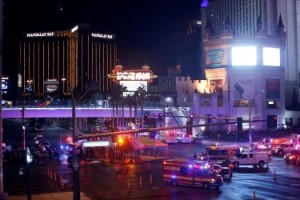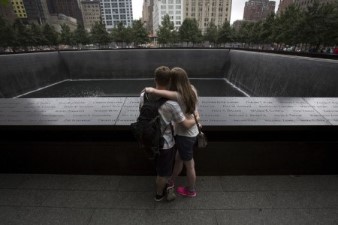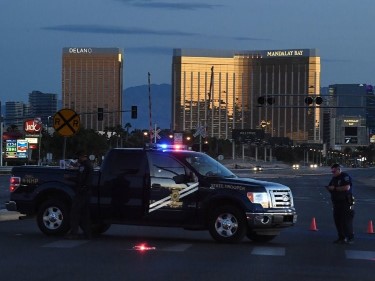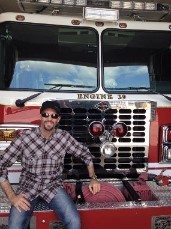
by Mark W Lamplugh Jr

Whenever we hear about a major tragedy in our nation like a terrorist attack, shooting, or natural disaster, our minds go right to the safety and protection needs of those who are affected. As a nation, we grieve their pain and suffering. The most recent tragedy is no different, as America woke up to hear news of a massive shooting at the Route 91 Harvest Music Festival in Las Vegas. This is one tragic incident in the lives of the 59 people who were killed and 527 more who were injured that night. For the on and off-duty first responders who heroically fled to the concert grounds to help them, it was one of many repeated emergency calls in their career.
Tragedies Trigger Traumatic Memories Re-Traumatizing Victims
America has certainly had its share of mass tragedies. In the 9/11 terrorist attacks, 2,996 people were killed, including the 19 terrorist hijackers. Building 7 of the World Trade Center housed a state-of-the-art emergency center. As the fire spread from the twin towers, building 7 collapsed, crippling New York city’s emergency response efforts even more. First responders and bystanders alike searched for victims who were buried alive in the rubble. Among the lives lost were 200 firefighters and 78 police officers.
The Las Vegas shooting is sure to trigger trauma for first responders in Orlando, where a gunman opened fire at a nightclub where gay people and others enjoyed the nightlife. Using an automatic assault rifle and handgun, the shooter killed 49 people and injured dozens. The first person that confronted him was a police officer.
Rick J. Kaufman, APR, is a nationally respected consultant and trainer on crisis management and communications, having worked in public schools and emergency management for the past 25 years. Rick was one of the first to arrive on the scene of the Columbine High School Shooting where 13 people were killed and 20 were injured. He provided emergency triage and rescue operations before assuming leadership of the Columbine Crisis Response Team.

I remember that day, Rick states, "As emergency responders, we are taught to check emotions and feelings at the door, go into auto-pilot to focus on the task at hand, as it should be ... but we feel many of the same emotions - fear, anxiety, and heartache. It's the after-the-event decompression that we find ourselves wrestling with the emotions and the 'what could I have done differently?' feelings. We may think setting aside these feelings and emotions will erase them from our conscience. They won't. They will return. Sometimes with a vengeance, and when we least expect. PTSD is very real.”
Rick, who also worked with the New York Education Commission and New York City Schools following 9/11, adds, “Our crisis response team experienced these effects in the wake of the Columbine High School tragedy. We managed and healed in our own way and time thanks to incredible mental health experts and grief counselors assigned to our team. Today the memories are just as real as they were then, but we are better able to cope, manage and lend aid when the mantle of responsibility is passed our way."
Sometimes, no one is responsible as in the events of Hurricanes Harvey and Irma. Thirty-nine people lost their lives in Houston, Texas, including a Houston police officer who was trying to save others. Before we could come to grips with our grief over Harvey, Hurricane Irma struck Florida, killing 31 people in 3 states. About 25% of the homes in the Florida Keys were destroyed.
The survivors of these tragedies rebuilt their homes, schools, businesses, and lives. And moved on.
The news reports and photos of the damage of the recent hurricanes most surely triggered traumatic memories for people in other parts of the country who survived Hurricane Katrina in Louisiana, Hurricane Sandy in New York, and other past disasters.
Victims of shootings in public places recently woke up to news of the Las Vegas shooting and relived their nightmares all over again.
Repeated Exposure to Traumatic Events Causes PTSD in First Responders
It comes as no surprise to hear that someone who lived through an awful tragedy would be triggered by a subsequent event or anniversary of the event. We try to soothe them as they struggle with the frightening memories, sights, smells, and sounds of the original tragedy. They don’t want to re-live it, but they can’t shake it off and wipe it away. Many people find healing in therapeutic counseling, treatment, or support groups. And for many, time helps healing along. Our first responders don’t really have a way of escaping tragic events. Their jobs require them to face crises every day. There is no escape, as Kaufman noted, only ways to try to cope with it.
First responders must face the immediate trauma including loss of life and life-threatening injuries. Often, the loss of life was a heroic one of their own. While first responders may be able to cast many of the memories aside, their bodies remember the trauma. The thoughts of a victim’s basic needs of safety and protection not being met during an emergency call trigger their own need to protect themselves. Anxiety paralyzes them. This is what PTSD looks like.
Searching for Ways to Cope with Repeated Trauma and PTSD
While the average citizen might respond to the insistence of others to attend therapy for their emotional pain, first responders are often hesitant. Anxiety and emotional unrest plague every area of the first responders’ lives. It affects their decisions at work and interferes with relationships with their spouses and children at home. Unable to process the effects of trauma and PTSD, first responders look for ways to dull the pain. Many of them turn to excessive alcohol drinking or using drugs. These types of unhealthy coping habits may lead to problems with addiction.

There’s something about terrible tragedies that bring people together. Organizations take up collections for food and supplies. Clean up crews donate their time. The community rebuilds itself stronger and more cohesively. When rebuilding communities after a tragedy, it’s important for us not only to thank our heroes but to acknowledge that they hurt too. Your crisis may have been large or small, but you need to remember that they’ve to experience trauma as an everyday occurrence.
One of the best things you can do for them is to support your community’s first responders by encouraging them to receive professional treatment for job-related trauma. There’s no one better for that job than the therapists at Frontline Responder Services, an agency of current and former first responders with lived experience as emergency responders. Your community’s first responders will have a higher level of comfort when sharing traumatic experiences with a treatment professional who is also a trusted colleague.
Tragedies will happen again, usually when we least expect them. We can count on our first responders to rush to the scene to help. Can they count on your support to rush to their aid in their time of need?
ABOUT THE AUTHOR

Mark Lamplugh is a fourth-generation firefighter and former captain with the Lower Chichester (PA) Fire Company. He was the Chief Executive Officer of 360 Wellness Inc and currently the Vice President of Responder Services of Frontline Responder Services at Advanced Health & Education and Cedar Point Recovery. Lamplugh is also nationally recognized in Crisis Stress Intervention through the American Academy of Experts in Traumatic Stress. Lamplugh hosts his own talk show called "Firefighter Wellness Radio" with Fire Engineering. He has helped thousands of firefighters, police officers, veterans, EMS personnel, and civilians nationwide find help for addiction, alcoholism, PTSD, and mental health support. Mark has been chosen as one of the Board of Directors at One World For LifeTo head up Communication and the Health & Safety section). He can be reached for comment mark@360wellness.org.








